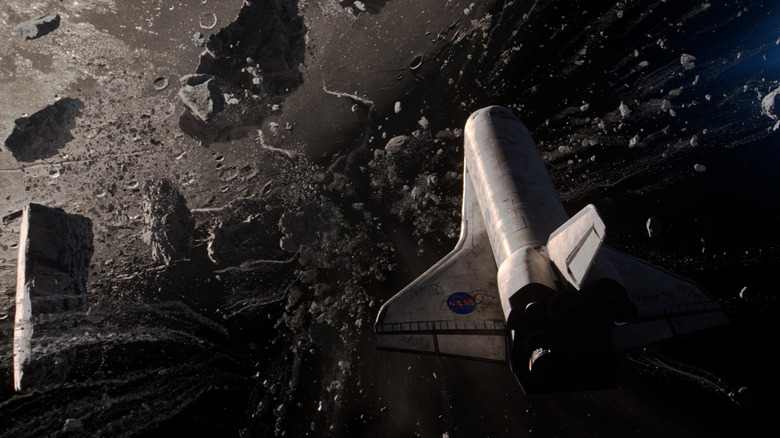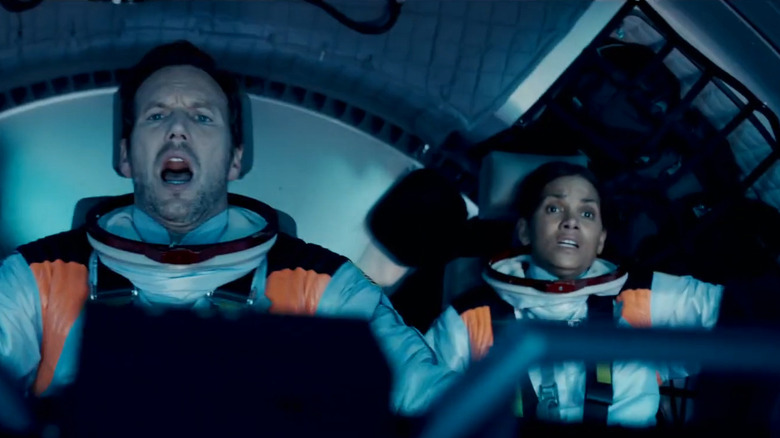Moonfall Has Bombed Its Way Into The Record Books, And That's Concerning
For the past year and change, virtually every big movie that has been released has come with a bit of a caveat. We're attempting to emerge from a global pandemic and what used to be, no longer is. Yes, movies like "Spider-Man: No Way Home" and "The Batman" can still make hundreds of millions at the box office, but everything else is out there fighting for enough eyeballs to keep non-superhero flicks financially viable. Unfortunately, flops have been more frequent than anyone would care to see as of late — and it's "Moonfall" that stands a cut above the rest.
Disaster movie aficionado Rolland Emmerich returned to dizzyingly crazy heights with "Moonfall," a movie that sees the moon falling to Earth, with one hell of a wacky sci-fi twist in the third act. Emmerich managed to put together the movie's massive budget without a major studio or streaming service, raising the funds independently through a variety of partners around the world. Unfortunately, that means a lot of people are getting punched in the wallet, as the movie has quite frankly flopped itself into the record books.
The numbers are brutal
Against a gigantic budget of $140 million (not accounting for marketing), "Moonfall" has made just $39.2 million to date at the global box office. To be clear, that number would be disastrous if we were just talking about domestic ticket sales with a slightly more robust international haul. But that's every penny that it has made thus far, and that means it is now up there with some of the most notable bombs in box office history.
While lots and lots of big movies have bombed in epic fashion over the years, some of the biggest of the big ones that are cited as the worst ever include "Mars Needs Moms," Disney's gigantic $150 animated flop that, oddly enough, also topped out at $39.2 million back in 2010. Then there's Eddie Murphy's "The Adventures of Pluto Nash," a dazzlingly bad performance for a movie with a $100 million budget, taking in a paltry $7.1 million in total. Just brutal stuff. Another often-cited legendary failure was 1995's "Cutthroat Island," which made just $10 million in total against a whopping $98 million budget.
Sure, there are plenty of other movies that have lost lots and lots of money over the years, but few movies that were so expensive to make have ever made so little in terms of raw dollars at the box office. It's rarefied air in the worst kind of way, and the kind of disaster that the industry at large can ill-afford right now.
How much will everyone lose?
Studio accounting always makes things interesting and tough to nail down. The movie business, at times, doesn't make much sense as a business. Just look at Fox trying to say that "Bohemian Rhapsody" lost money despite making a stunning $910 million at the box office. Yet, movies like "Pacific Rim," which made $411 million and cost far more to make, end up getting a sequel. The point is, getting word from the people who are actually in charge on how much something did or did not make is and always has been a grey area at best.
That having been said, the financial partners on "Moonfall" figure to be in bad shape. Lionsgate distributed the film but isn't on the hook for the movie's huge budget, at least not nearly all of it. Emmerich also partnered with Chinese firm Huayi, AGC Studios, CAA Media Finance, and other distribution partners around the world, amongst other entities. As a rough rule of thumb, studios get about half of the money made from ticket sales, so we're looking at maybe $20 million there. Even if we give the studio the benefit of the doubt on marketing and say they somehow only spent $75 million to market it (even though the rule of thumb typically is to double the budget for marketing), that would still leave the production at $195 million in the hole.
Once cable rights, Blu-ray sales, and other ancillary revenue streams are accounted for (and Amazon has locked up some streaming rights for the film), it would be very easy to see the total loss eclipsing $100 million — if not much more. How that ends up getting shared amongst the financial partners isn't known but lots of unhappy people are looking at those numbers right now, that much is certain. Lionsgate should probably avoid these big-budget bets in the future and, since they aren't on the hook for the lion's share of the budget, consider this a warning.
So what went wrong?
It's tough to dissect bombs like this but it often comes down to critical response. The fact of the matter is that critics were not too kind to "Moonfall" and audiences weren't out there delivering good word of mouth to help combat that. This was not a "Venom" situation where the critical opinion didn't seem to matter. Some solid buzz could have benefitted this very out-there blockbuster. Not to say it would have provided a $300 million boost, but it couldn't have hurt matters any.
Beyond that, the main thing right now is that audiences are mostly only turning up for sure things right now. That's why horror and superhero movies are the only things right now that consistently deliver. It's also why some of our greatest filmmakers such as Ridley Scott and Steven Spielberg have also had to suffer big-budget flops while delivering great movies with "The Last Duel" and "West Side Story," respectively. It's not just the Emmerichs of the world.
The fact is, disaster movies are always risky but when it pans out as it did for Emmerich with "2012" and "The Day After Tomorrow," they hit big. "Moonfall" was made without the pandemic in mind and would have been a risk even under normal circumstances. In this case? It proved to be a downright ruinous formula for what not to do in modern Hollywood, unfortunately.



